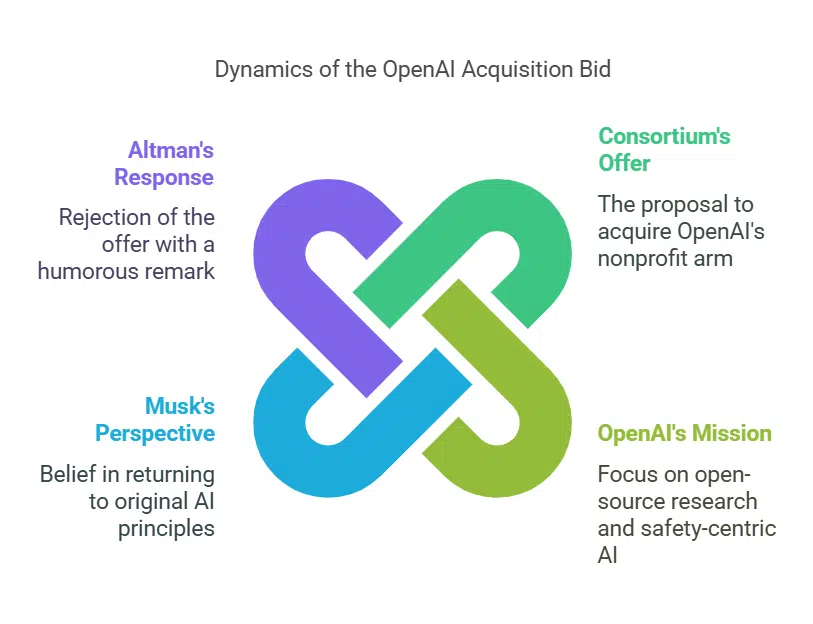In a significant escalation within the artificial intelligence (AI) sector, a consortium led by Elon Musk has proposed a $97.4 billion acquisition of the nonprofit organization that oversees OpenAI. This move intensifies the ongoing dispute between Musk and OpenAI’s CEO, Sam Altman, regarding the organization’s strategic direction and foundational principles.
The Genesis and Evolution of OpenAI
Established in 2015, OpenAI was co-founded by Elon Musk, Sam Altman, and other prominent tech figures with the mission to advance digital intelligence in a way that benefits humanity as a whole. The organization was initially structured as a nonprofit, emphasizing open-source research and a commitment to safety in AI development.
In 2018, Musk departed from OpenAI’s board due to strategic disagreements concerning the organization’s trajectory. He expressed concerns over the shift in focus and the potential risks associated with certain AI advancements. Following his departure, Musk has been an outspoken critic of OpenAI’s evolution, particularly its transition from a nonprofit to a for-profit model.
The Unsolicited Bid: Details and Implications
The consortium’s offer to acquire the nonprofit arm of OpenAI is seen as an attempt to revert the organization to its original mission of open-source research and safety-centric AI development. Musk has been vocal about his belief that OpenAI has strayed from its foundational principles, especially with its recent moves towards commercialization and profit-driven initiatives.
In response to the acquisition proposal, Sam Altman promptly declined the offer. Taking to X (formerly Twitter), Altman quipped, “No thank you, but we will buy Twitter for $9.74 billion if you want.” This remark alludes to Musk’s 2022 acquisition of Twitter for $44 billion, highlighting the ongoing tension and rivalry between the two tech magnates.
Legal Battles and Strategic Disputes
The friction between Musk and Altman extends beyond public exchanges. Musk has initiated legal proceedings against OpenAI, aiming to prevent its transition to a for-profit entity. He argues that such a move contradicts the organization’s original charitable mission and could lead to ethical compromises in AI development. Musk’s lawsuit seeks to ensure that OpenAI remains aligned with its initial commitment to open-source research and the broader benefit of humanity.
Musk’s $97.4 billion bid stands in stark contrast to recent valuations of OpenAI. Reports indicate that SoftBank is nearing a $40 billion investment in OpenAI, which would value the company at approximately $260 billion. This significant disparity underscores differing perspectives on OpenAI’s market worth and the potential financial implications of its strategic decisions.
The Stargate Project: A Bold Venture in AI Infrastructure
Amid these developments, OpenAI has announced a collaborative initiative known as the Stargate Project. This joint venture, involving OpenAI, SoftBank, Oracle, and MGX, plans to invest up to $500 billion in AI infrastructure across the United States by 2029. The project aims to build state-of-the-art data centers and advance AI research capabilities, reinforcing OpenAI’s commitment to leading in the AI sector.
Industry Reactions and Future Outlook
The tech community is closely monitoring these developments, recognizing their potential to reshape the AI industry’s landscape. Musk’s bid to acquire OpenAI’s nonprofit arm, coupled with his legal challenges, introduces uncertainties about the organization’s future direction and governance. Concurrently, OpenAI’s ambitious projects and significant investments signal its determination to remain at the forefront of AI innovation.
As the situation unfolds, stakeholders await further announcements and decisions that will influence the trajectory of AI research and its applications in various sectors.





































